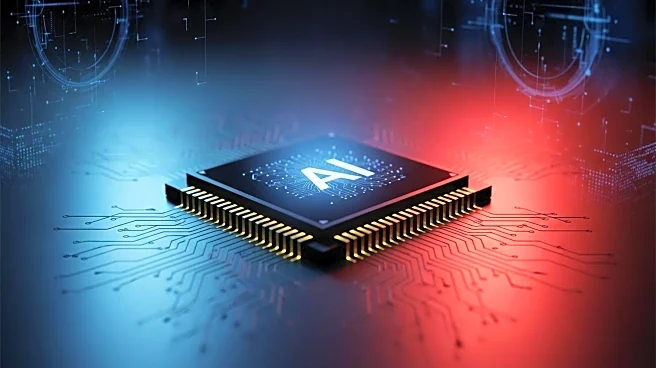What's Happening?
The ongoing race between the United States and China to dominate artificial intelligence (AI) technology is raising concerns about secrecy and competition. The article discusses the historical context of secrecy in technological advancements, drawing parallels with the atomic bomb's development. It highlights the current situation where both nations are striving to secure the best AI minds, GPUs, and algorithms. Export controls are in place to restrict the flow of technology, but these measures are proving insufficient as models like Meta's have leaked, leading to rapid imitations and advancements. The article proposes a system of 'partial sharing' to reduce competition and enhance mutual benefits, suggesting transparency about AI capabilities and the establishment of neutral testbeds for international cooperation.
Why It's Important?
The secrecy surrounding AI development has significant implications for global technology leadership and international relations. The U.S. and China are at the forefront of this technological race, and their actions could shape the future of AI governance. The lack of transparency and the competitive nature of AI development could lead to increased tensions and a potential arms race in technology. By adopting a more open approach, as suggested in the article, there could be a reduction in competitive pressures and an increase in collaborative efforts, potentially leading to safer and more ethical AI advancements. This approach could also set a precedent for international cooperation in other emerging technologies.
What's Next?
The article suggests that moving forward, there should be a focus on creating systems that allow for partial sharing of AI capabilities and establishing international testbeds for AI models. This would involve governments requiring high-risk AI systems to publish safety guidelines before their release. Additionally, encouraging open-source models could help standardize AI development and reduce the risks associated with secretive advancements. These steps could foster a more cooperative international environment and mitigate the risks of an AI arms race.
Beyond the Headlines
The ethical and legal dimensions of AI secrecy are profound. The article implies that maintaining secrecy in AI development could lead to ethical dilemmas, as secret systems may provide cover for malicious actors. By promoting transparency and open-source models, there is potential to enhance ethical standards and accountability in AI development. This shift could also influence cultural perceptions of AI, promoting a view of technology as a collaborative tool rather than a competitive weapon.










